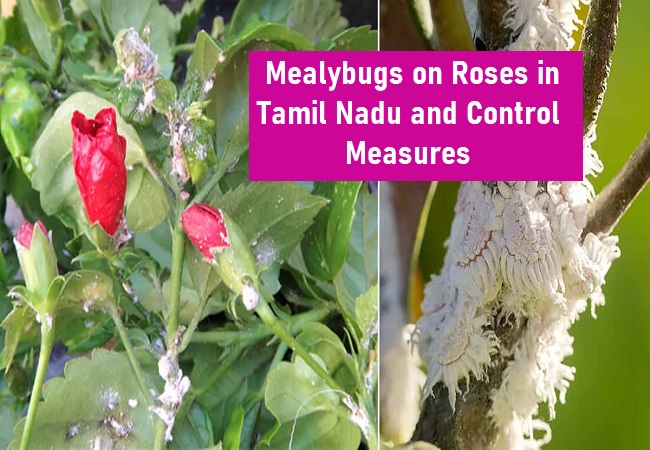What are the effects of Mealybugs on roses in Tamil Nadu, and how can they be controlled?
Mealybugs are small insects that belong to the family Pseudococcidae. They are common pests that can have detrimental effects on roses in Tamil Nadu, as well as in other regions. Here's an explanation of the effects of mealybugs on roses and some methods to control them:
Effects of Mealybugs on Roses:
Weakening and Stunting: Mealybugs feed on the sap of rose plants, which can lead to weakened growth and stunted development. Infested roses may exhibit poor vigor, reduced flowering, and overall decline in health.
Honeydew and Sooty Mold: Mealybugs secrete a sticky substance called honeydew while feeding. This honeydew serves as a medium for the growth of sooty mold, a black fungal growth that covers the leaves, stems, and flowers of roses. Sooty mold can interfere with photosynthesis and further weaken the plant.
Deformation and Distortion: Heavy infestations of mealybugs can cause distortion and deformation of rose leaves, buds, and shoots. The distorted growth may result in misshapen flowers and reduce the aesthetic appeal of the roses.
Methods to Control Mealybugs on Roses:
Manual Removal: For light infestations, physically removing mealybugs by hand or with a soft brush can be effective. Carefully inspect the plants, focusing on areas where mealybugs tend to congregate, such as leaf axils and stem joints.
Pruning Infested Parts: If mealybugs are localized to specific branches or parts of the plant, pruning and discarding the infested sections can help prevent further spread of the pests.
Natural Predators: Encouraging natural predators of mealybugs, such as ladybugs, lacewings, and parasitic wasps, can provide biological control. These beneficial insects feed on mealybugs and help keep their populations in check. Avoid using broad-spectrum insecticides that may harm these predators.
Horticultural Oil or Insecticidal Soap: Applying horticultural oil or insecticidal soap directly on the mealybugs can suffocate and kill them. These products need to come in direct contact with the pests, so thorough coverage of the infested areas is important. Follow the instructions on the product label for proper application.
Systemic Insecticides: In severe infestations, systemic insecticides can be used. These are applied to the soil or absorbed by the plant and are translocated throughout its system. Systemic insecticides can be effective against mealybugs but should be used judiciously, following the instructions and precautions mentioned on the product label.
Cultural Practices: Implementing good cultural practices can help prevent mealybug infestations. This includes regular inspection of plants, maintaining proper sanitation by removing and disposing of infested plant material, and providing adequate sunlight, air circulation, and appropriate watering to promote plant health.
It's important to note that the choice of control methods should be based on the severity of the infestation and the specific circumstances of the rose garden. Integrated Pest Management (IPM) practices that combine multiple control strategies are often the most effective and environmentally friendly approach to managing mealybugs on roses.

